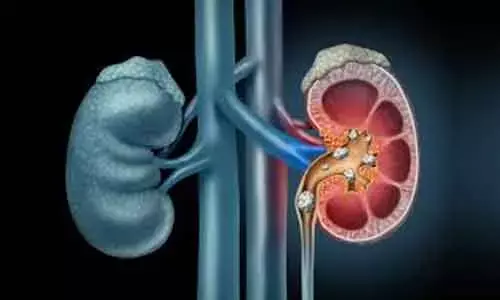- Home
- Medical news & Guidelines
- Anesthesiology
- Cardiology and CTVS
- Critical Care
- Dentistry
- Dermatology
- Diabetes and Endocrinology
- ENT
- Gastroenterology
- Medicine
- Nephrology
- Neurology
- Obstretics-Gynaecology
- Oncology
- Ophthalmology
- Orthopaedics
- Pediatrics-Neonatology
- Psychiatry
- Pulmonology
- Radiology
- Surgery
- Urology
- Laboratory Medicine
- Diet
- Nursing
- Paramedical
- Physiotherapy
- Health news
- Fact Check
- Bone Health Fact Check
- Brain Health Fact Check
- Cancer Related Fact Check
- Child Care Fact Check
- Dental and oral health fact check
- Diabetes and metabolic health fact check
- Diet and Nutrition Fact Check
- Eye and ENT Care Fact Check
- Fitness fact check
- Gut health fact check
- Heart health fact check
- Kidney health fact check
- Medical education fact check
- Men's health fact check
- Respiratory fact check
- Skin and hair care fact check
- Vaccine and Immunization fact check
- Women's health fact check
- AYUSH
- State News
- Andaman and Nicobar Islands
- Andhra Pradesh
- Arunachal Pradesh
- Assam
- Bihar
- Chandigarh
- Chattisgarh
- Dadra and Nagar Haveli
- Daman and Diu
- Delhi
- Goa
- Gujarat
- Haryana
- Himachal Pradesh
- Jammu & Kashmir
- Jharkhand
- Karnataka
- Kerala
- Ladakh
- Lakshadweep
- Madhya Pradesh
- Maharashtra
- Manipur
- Meghalaya
- Mizoram
- Nagaland
- Odisha
- Puducherry
- Punjab
- Rajasthan
- Sikkim
- Tamil Nadu
- Telangana
- Tripura
- Uttar Pradesh
- Uttrakhand
- West Bengal
- Medical Education
- Industry
PPIs use may lead to kidney stone formation, finds study

USA: The use of proton pump inhibitors (PPIs) -- medications widely used for stomach acid suppression -- can increase the risk of kidney stones, according to a recent study in the journal Clinical Gastroenterology and Hepatology. Further, the use of histamine-2 receptor antagonists (H2RA) was also found to be associated with kidney stones risk, suggesting that acid suppression might be an involved mechanism.
PPIs are widely prescribed medications and impacts urinary ion concentrations and gut ion absorption. Therefore, PPIs might contribute to or protect against the development of kidney stones. Michael Simonov, Yale School of Medicine, New Haven, Connecticut, and colleagues investigated the association between PPI use and kidney stones by conducting a retrospective study.
They used data from the Women's Veteran's Cohort Study that comprised of men and women from October 1, 1999, through September 30, 2017. Data was collected from 465,891 patients on PPI usage over time, demographics, laboratory results, comorbidities, and medication usage. The risk of PPI use and incident development of kidney stones was determined using time-varying Cox proportional hazards and propensity matching analyses. The use of histamine-2 receptor antagonists (H2RAs) was measured and levothyroxine use was a negative control exposure.
Key findings of the study include:
- PPI use was associated with kidney stones in the unadjusted analysis, with PPI use as a time-varying variable (hazard ratio [HR], 1.74), and persisted in the adjusted analysis (HR, 1.46).
- The association was maintained in a propensity score-matched subset of PPI users and nonusers (adjusted HR, 1.25).
- Increased dosage of PPI was associated with increased risk of kidney stones (HR, 1.11 for each increase in 30 defined daily doses over a 3-month period).
- H2RAs were also associated with increased risk (adjusted HR, 1.47).
- There was no association, in adjusted analysis, of levothyroxine use with kidney stones (adjusted HR).
"In a large cohort study of veterans, we found PPI use to be associated with a dose-dependent increase in risk of kidney stones. H2RA use also has an association with risk of kidney stones, so acid suppression might be an involved mechanism. The effect is small and should not change prescribing for most patients," concluded the authors.
The study, "Use of Proton Pump Inhibitors Increases Risk of Incident Kidney Stones," is published in the journal Clinical Gastroenterology and Hepatology.
DOI: https://doi.org/10.1016/j.cgh.2020.02.053
Dr Kamal Kant Kohli-MBBS, DTCD- a chest specialist with more than 30 years of practice and a flair for writing clinical articles, Dr Kamal Kant Kohli joined Medical Dialogues as a Chief Editor of Medical News. Besides writing articles, as an editor, he proofreads and verifies all the medical content published on Medical Dialogues including those coming from journals, studies,medical conferences,guidelines etc. Email: drkohli@medicaldialogues.in. Contact no. 011-43720751


